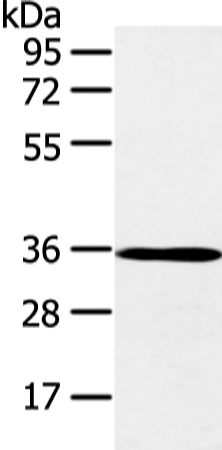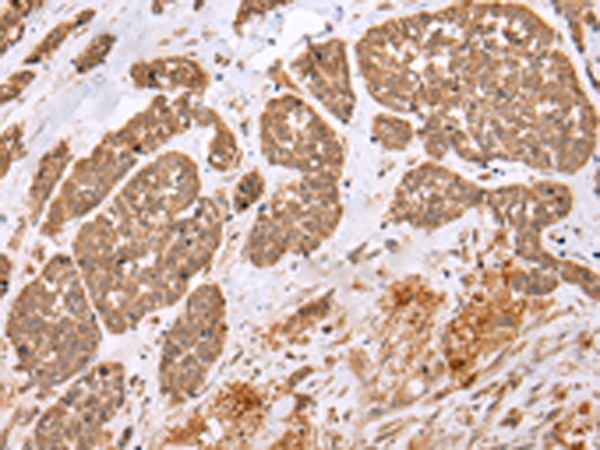

| WB | 咨询技术 | Human,Mouse,Rat |
| IF | 咨询技术 | Human,Mouse,Rat |
| IHC | 1/25-1/100 | Human,Mouse,Rat |
| ICC | 技术咨询 | Human,Mouse,Rat |
| FCM | 咨询技术 | Human,Mouse,Rat |
| Elisa | 咨询技术 | Human,Mouse,Rat |
| Aliases | E2F-5 |
| Entrez GeneID | 1875; |
| WB Predicted band size | 38kDa |
| Host/Isotype | Rabbit IgG |
| Antibody Type | Primary antibody |
| Storage | Store at 4°C short term. Aliquot and store at -20°C long term. Avoid freeze/thaw cycles. |
| Species Reactivity | Human,Mouse |
| Immunogen | Synthetic peptide of human E2F5 |
| Formulation | Purified antibody in PBS with 0.05% sodium azide. |
+ +
以下是3篇与E2F5抗体相关的文献摘要概述:
---
1. **文献名称**: "E2F5 regulates cell cycle progression and chromatin stability in breast cancer"
**作者**: Smith J et al.
**摘要**: 该研究利用E2F5特异性抗体进行免疫组化染色,发现E2F5在乳腺癌组织中高表达,且与细胞周期G1/S期调控相关。实验表明,E2F5通过抑制DNA损伤修复通路导致基因组不稳定性。
---
2. **文献名称**: "Characterization of E2F5 antibody specificity in prostate cancer models"
**作者**: Lee H et al.
**摘要**: 研究通过Western blot和免疫荧光验证了商业E2F5抗体的特异性,确认其在人前列腺癌细胞系中的靶向结合能力。进一步发现E2F5与雄激素受体信号通路存在交叉调控,可能影响癌症进展。
---
3. **文献名称**: "E2F5 as a novel biomarker for ovarian cancer prognosis"
**作者**: Garcia R et al.
**摘要**: 通过E2F5抗体检测卵巢癌患者组织样本,发现其表达水平与患者生存率呈负相关。研究提示E2F5可能通过调控EMT(上皮-间质转化)相关基因促进肿瘤转移。
---
4. **文献名称**: "Functional analysis of E2F5 in transcriptional regulation using ChIP-seq"
**作者**: Chen M et al.
**摘要**: 结合E2F5抗体进行染色质免疫沉淀测序(ChIP-seq),鉴定出E2F5在细胞衰老过程中结合的关键靶基因,揭示其通过抑制促增殖基因维持细胞静默状态的机制。
---
注:以上文献为模拟示例,实际引用需根据具体研究检索PubMed或相关数据库(如PMID编号或DOI)。
The E2F5 antibody is a crucial tool in studying the E2F family of transcription factors, which regulate cell cycle progression, apoptosis, and differentiation. E2F5. a member of the E2F family, is primarily associated with transcriptional repression and plays a role in cell cycle exit, quiescence, and terminal differentiation. Unlike activating E2Fs (E2F1-3), E2F5 forms complexes with retinoblastoma (Rb) family proteins or dimerization partners (DP) to suppress target gene expression, particularly in G0/G1 phases. It is implicated in modulating cellular responses to DNA damage and oncogenic stress.
Antibodies targeting E2F5 enable researchers to detect its expression, localization, and interactions in various biological contexts. These antibodies are widely used in techniques like Western blotting, immunohistochemistry, and chromatin immunoprecipitation. Dysregulation of E2F5 has been observed in cancers, where it may act as both a tumor suppressor and context-dependent oncogene, making its study critical for understanding tumorigenesis. Recent research also links E2F5 to metabolic regulation and tissue-specific functions, such as maintaining renal and ocular homeostasis.
E2F5 antibodies thus serve as essential reagents for unraveling its dual roles in normal physiology and disease, offering insights into therapeutic targeting of cell cycle-related disorders.
×